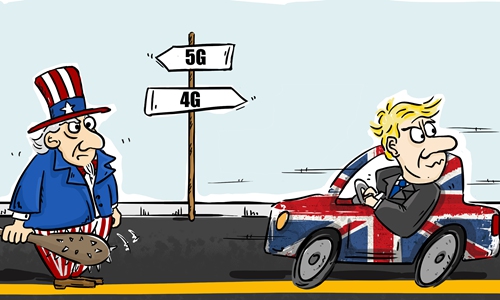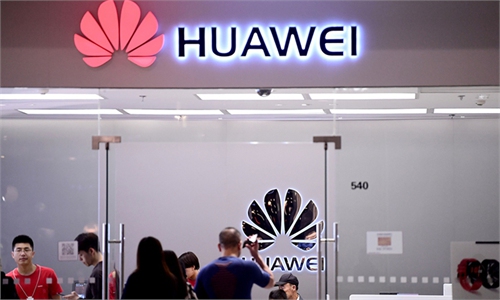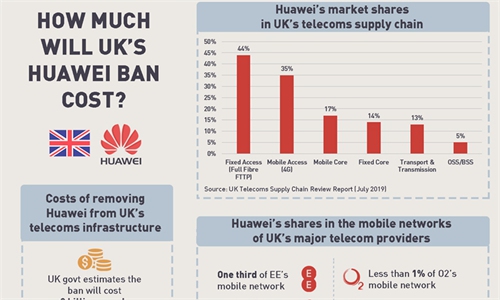
Illustration: Chen Xia/GT
Recently, the UK has repeatedly taken actions to undermine China-UK relations. This has challenged China's economic, security and development interests.This includes the UK's offer to 3 million Hong Kong residents the chance to live and work in the UK, which could pave the way for Hong Kong's violent rioters to flee. It also involves the British government's announcement that Huawei would be excluded from 5G network construction in the UK. UK military chiefs have even drawn up plans to base one of Britain's new aircraft carriers in the Far East to confront China, according to The Times.
These actions seem to be lined up with US foreign policies. They go against the general trend of pragmatic cooperation between China and the Great Britain.
An editorial in the Financial Times said that China-UK relations have been deteriorating "from golden era to the deep freeze." The current twists and turns in China-UK relations make people wonder to what extent the US has intervened in current British foreign policy.
Apparently, the UK is the closest ally of the US. Ever since the two signed the Atlantic Charter during World War II, the US and the UK have maintained a special relationship. The deep historical, cultural and military ties between the two countries demonstrate that they have more consistent views and actions on most international issues than any of their other allies.
Robert O'Brien, US national security advisor, traveled to Europe on July 13 for a three-day visit and met his counterparts from the UK, France, Germany and Italy. His main task was to further unite the European countries to form a Western united front against China.
In the context of the continuous and all-round suppression and containment of China by the US, Britain - one of the five permanent members of the UN Security Council, a member of the Five Eyes intelligence alliance, and core component of NATO - plays a significant role in US strategy against China. This is particularly true when it comes to the Huawei issue.
As the US regards the Huawei issue as a powerful key to deal with China, it will certainly not let the Chinese company carry out business in the UK smoothly.
Before and after the UK decided to allow Huawei to participate in the construction of its 5G networks, the US has repeatedly pressed the UK to exclude Huawei from the UK market.
In January 2020, the British government's decision to allow Huawei to take part in the UK's 5G construction on a limited basis irritated the US political circles. But the UK's recent decision to exclude Huawei satisfied those anti-China politicians in the US, such as Mike Pompeo, Marco Rubio, and O'Brien.
Whether the UK supports the US on such matters as the Huawei issue has strategic implications. From a broader perspective, the US is well aware that Britain's policy toward China is an indicator for other European countries. If Britain withstands the pressure from the US, other European countries probably would be more likely to adopt a more independent China policy.
In the wake of China's national security legislation for Hong Kong, Britain is one of the most vocal Western powers to act against it. Why? Because of its colonial complex and Western superiority. Under the influence of such distorted emotions and thinking, conservative politicians in the UK have generally politicized China-related issues.
At the same time, some UK political forces are enamored with anti-China forces in the US, and are dancing a Tango with them. They don't treat China-related issues objectively. For example, whether or not Huawei equipment poses a threat is no longer an issue of scientific and technological assessments. It has become a matter of ideology.
It is obvious now that Britain has acted as an accomplice to US policies of China containment. This course of action runs counter to the UK's own national interests.
British diplomacy should be based on the vision of Global Britain, to make the UK a balancer among great powers, win more practical interests and develop its own international space. The UK will pay a heavy price if it follows the US lead - economic, scientific and technological cooperation as well as people-to-people exchanges between China and the UK will all suffer.
Dong Yifan is a research fellow with the Institute of European Studies, China Institutes of Contemporary International Relations. Sun Chenghao is an assistant research professor at the Institute of American Studies of the China Institutes of Contemporary International Relations. opinion@globaltimes.com.cn



